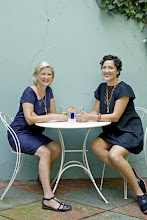i am a very lucky fashion designer/girl to have lynda grose, my mentor from CCAC at my disposal. this post is simply the email response i received from her after she read my post on "the real cost of your cheap sweater". there is hope.
HI caroline,
I loved your article on the real cost of cheap sweaters. Its a real dilemma, once you start scratching the surface of 'sustainable' fashion design. Substitution of materials is still 'more stuff', even if its organic....
The real issues are over consumption and an increasing population ... that is building in wealth and therefore set to consume even more, more quickly.
Changing consumptive behaviour is key
and communicating to the consumer to influence this is key
through the nineties, we thought Paul Hawken's ecology of commerce was the answer.....businesses had the economic power..and therefore the power to effect change....
..but this isn't happening fast enough..and companies listen to their consumer...if the consumer shifts the companies will follow. The new focus for this decade is the consumer...
So, writing a public honest account of your thinking is just great...so much more powerful than Linda Laudemilk's or Edun's press releases.....it cuts through the marketing, grounds what you do in real ecological issues, educates the consumer deeply about systems issues...and will have an impact...eventually (cultural shifts in behaviour take a long time so be patient but vigilant....)
i am going to forward this address on to Kate Fletcher in UK who is writing a book on sustainable fashion design...another deep thinker....check out her work via google
also, here are some references to encourage you to continue in your thinking:
Welford, Environmental Strategy and Sustainable Development
1995
(abreviated)
Five imagined user phases in the transition to an ecological future:
1 purchase with no attention to the environment.
2 More observant of environment activities...reluctant compliance...purchase reflect enforced actions..
3 begin to seek out products that are less damaging...
4 consumers question the need for the product as a legitimate use of the worlds resources...purchasing behaviour exhibits strong environmental demands..over whole lifecycle of the product.....
5 consumers have respect for all living things in the biosphere...traslates to a reduced level of consumption to ensure that the ecobalance is maintained.
marks and Spencer's statement made last week...talks about influencing their customers behaviour and being carbon neutral (see attached)
a report from cambridge Universirty on the UK textile industry..see the conclusions which include changing the behaviour of the customer...to consume less... (see attached)
so you are not alone in your thinking
keep communicating the way you are....
...perhaps think through some ways to implement different concepts to supplement your line each season to illustrate different ways you might address the problem you have identified....????
...in the meantime source from certified managed cashmere resources if you can....
hope this is helpful.
love lynda
Subscribe to:
Post Comments (Atom)


No comments:
Post a Comment